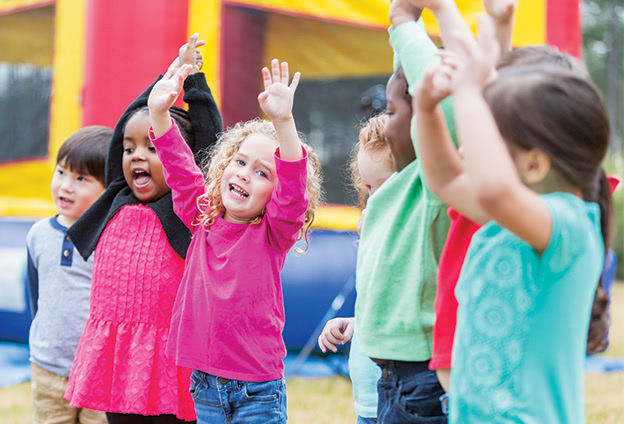
Section
Your Toddler from 2 to 3 Years
Between ages 2 and 3, your toddler is able to do many new things. She runs and jumps and likes to be active. She talks in phrases and has conversations with you. She tests her limits—and yours. She may break into tears or have tantrums because she cannot do everything for herself. She still needs your guidance to learn self-control. And she needs your help to understand what others need.
Where to Find Help
Services for babies and toddlers at risk of disability or who have a disability.
1-800-515-2229
Things You Can Do
Help Your Toddler Learn
Make sure your toddler gets to play with other children.
Make sure your child gets time for active play outdoors.
Talk, read, sing, and tell stories together. Your child learns best when she is near you and can see your face.
Use simple words to explain how things work.
Ask questions that require more than “yes” or “no” answers. This helps your toddler learn to talk.
Let your toddler work through problems before you offer help. Then give only the help she needs to safely continue on her own.
Read to Your Child
Go to the library and pick out some books. Many libraries have weekly story times, when someone reads aloud to children.
Act out stories, with a voice for each character.
Make up your own story to go with the pictures.
Take Care of Your Toddler’s Teeth
Brush your toddler’s teeth twice a day. Use a soft child’s toothbrush and a pea-sized amount of toothpaste with fluoride. Teach her to spit out the toothpaste. For more information, see Oral Health [Hyperlink to the Oral Health chapter].
Toddlers Talk More
Your toddler uses 4- and 5-word sentences.
She follows 2-step directions, like “Get the ball and put it on the table.”
At 2 years, other people can understand her speech some of the time. At 3 years, people can understand her most of the time.

Toddlers enjoy simple, active games like “Follow the leader.”
Children Develop Differently
Toddlers are learning many new skills. Each child develops and learns at her own pace. Try not to compare your child with other children. If you think there may be a problem or if your child loses skills she once had, talk to her doctor.
Play with Your Toddler
Toss or roll a soft ball back and forth. Practice kicking a ball.
Fit plastic bowls into each other.
Build towers with blocks.
Draw together.
Work on simple puzzles together.
Play simple, active games with your toddler. “Follow the leader” is a good game. Remember to keep games short, and be flexible about the rules.
Encourage your child to use her imagination in “Let’s pretend” games, like tea parties or stuffed animal “zoos.”